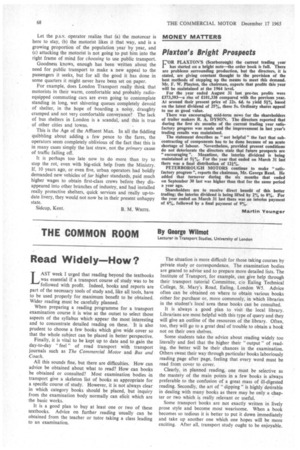THE COMMON ROOM Read Widely How?
Page 70

If you've noticed an error in this article please click here to report it so we can fix it.
LAST week I urged that reading beyond the textbooks was essential if a transport course of study was to be followed with profit. Indeed, books and reports are part of the necessary tools of study and, like all tools, have to be used properly for maximum benefit to be obtained. Wider reading must be carefully planned.
When preparing a reading programme for a transport examination course it is wise at the outset to select those aspects of the syllabus which appear the most interesting and to concentrate detailed reading on these. It is also prudent to choose a few books which give wide cover so that the whole subject can be placed in better perspective.
Finally, it is vital to be kept up to date and to gain the day-to-day " feel " of road transport with transport journals such as The Commercial Motor and Bus and Coach.
All this sounds fine, but there are difficulties. How can advice be obtained about what to read? How can books be obtained or consulted? Most examination bodies in transport give a skeleton list of books as appropriate for a specific course of study. However, it is not always clear in which category books should be placed, but inquiry from the examination body normally can elicit which are the basic works.
It is a good plan to buy at least one or two of these textbooks. Advice on further reading usually can be obtained from the teacher or tutor taking a class leading to an examination. The situation is more difficult for those taking courses by private study or correspondence. The examination bodies are geared to advise and to prepare more detailed lists. The Institute of Transport, for example, can give help through their transport tutorial Committee, c/o Ealing Technical College, St. Mary's Road, Ealing, London W5. Advice often can be obtained on where to obtain various books either for purchase or, more commonly, in which libraries in the student's local area these books can be consulted.
It is always a good plan to visit the local library. Librarians are most helpful with this type of query and they will give an outline of the resources of the library. Often, too, they will go to a great deal of trouble to obtain a book not on their own shelves.
Some students take the advice about reading widely too literally and feel that the higher their " output " of reading, the better will be their chances in the examination. Others sweat their way through particular books laboriously reading page after page, feeling that every word must be read from cover to cover.
Clearly, in planned reading, one must be selective as the mastery of the main points in a few books is always preferable to the confusion of a great mass of ill-digested reading. Secondly, the art of "dipping" is highly desirable in dealing with many books as there may be only a chapter or two which is really relevant or useful.
Some transport books are not exactly written in lively prose style and become most wearisome. When a book becomes so tedious it is better to put it down immediately and take up another one which one hopes will be more exciting. After all, transport study ought to be enjoyable.












































































































